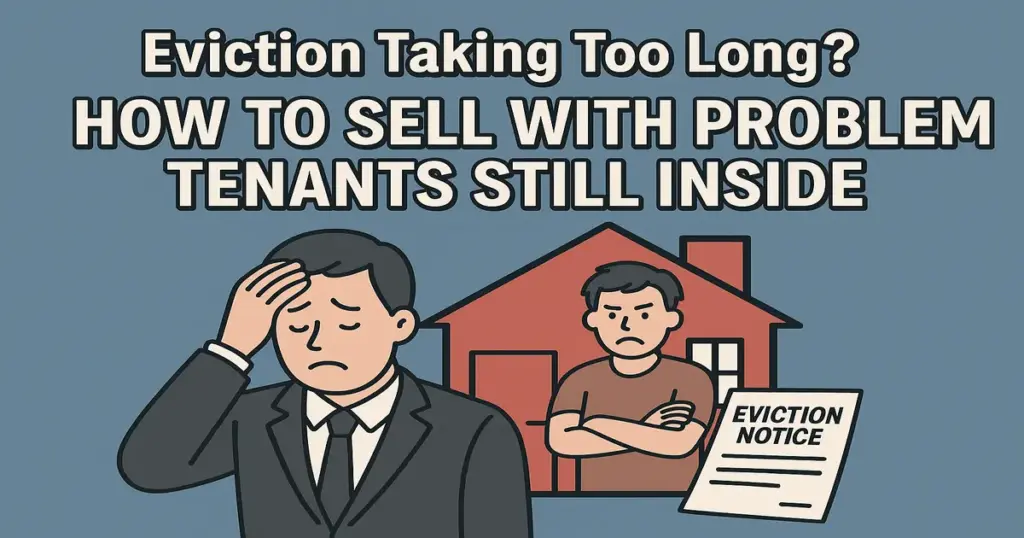Eviction Taking Too Long? How to Sell with Problem Tenants Still Inside
When a tenant stops paying rent, breaches the terms of their tenancy agreement, or becomes disruptive to neighbours, most landlords begin the formal eviction process, expecting resolution in a few short months.
However, the reality is often very different. With legal delays, court backlogs, and government restrictions, an eviction can take many months—or even years—especially in England and Wales. This leaves landlords with mortgage payments, mounting losses, and problematic tenants inside the property.
But what if there was a way out, without waiting for the eviction to complete?
In this guide, we explore how landlords can sell their property fast, even with tenants still inside—whether those tenants are refusing to leave, causing damage, or not paying rent. We’ll explain the legal position, the risks, and your real options to escape the rental trap and recover your investment.
The Harsh Truth: Evictions Can Take Too Long
Evictions used to be straightforward. Serve a notice, wait the required period, and get a possession order if the tenant didn’t comply. However, eviction timelines have ballooned since the COVID-19 pandemic and ongoing legislative reforms.
Even under Section 8 or Section 21 notices, landlords now face:
- Notice periods of up to 6 months (depending on grounds)
- Court hearing delays of several months due to backlogs
- Tenant appeals or applications to delay enforcement
- Bailiff delays of several weeks or more
- Legal costs often exceeding £1,000–£2,000
This extended timeframe exposes landlords to continuous mortgage repayments, lost rent, potential property damage, and Stress. And when the tenant is actively problematic—threatening, violent, or destructive—the situation becomes emotionally and financially draining.
Can You Sell a Property with Tenants Still Inside?
Yes. It is entirely legal to sell a property with tenants still in situ, even if they refuse to vacate.
You have two key options:
Sell with a Sitting Tenant
This means you sell the property with the current tenancy agreement. The buyer takes on the tenant as part of the sale. This is possible whether the tenant is paying rent or not.
Buyers willing to purchase with sitting tenants are typically:
- Cash house buying companies
- Landlords or investors looking for discounted opportunities
- Developers or asset buyers who may refurbish or repurpose
Sell to a Cash Buyer Despite Rent Arrears or Non-Cooperation
Many traditional buyers will walk away if the tenant is not paying rent or has breached their tenancy. However, specialist cash buyers purchase problem properties, even if:
- The tenant hasn’t paid rent in months
- The tenant refuses to communicate
- There is ongoing damage or anti-social behaviour
- An eviction notice has already been served
These buyers factor the risk into the offer price, but they relieve you of the legal headache and prevent further financial loss.
Why Sell with Problem Tenants Inside?
Here are the key reasons landlords choose this route:
✔️ Stop the Bleeding
You no longer have to pay the mortgage, council tax, insurance, or legal fees while you wait for a possession order.
✔️ Avoid Further Damage
Difficult tenants often retaliate when they know they’re being evicted. Selling as-is avoids more damage and repair bills.
✔️ Eliminate Stress
Dealing with aggressive, disruptive, or manipulative tenants takes a mental toll. Selling lets you cut ties permanently.
✔️ Cash Out Fast
Many buyers complete in 7–21 days. This allows you to move on to other investments or clear debts quickly.
How the Sale Process Works
Step 1: Get a Valuation
Contact a company or buyer that specialises in purchasing tenanted or distressed properties. Avoid estate agents—they often won’t take on these cases.
Step 2: Provide Documentation
This includes:
- Tenancy agreement (AST or otherwise)
- Rent statements
- Any Section 8/21 notices served
- Court or bailiff paperwork, if applicable
- Photos or a description of tenant conduct (optional)
Step 3: Get a Cash Offer
The offer may be below full market value, but it reflects:
- The risk of ongoing tenant occupation
- Legal delays
- Potential property damage
- Lack of access for viewings or surveys
For many landlords, the discount is worth it to escape months—or years—of uncertainty.
Step 4: Complete the Sale
Cash buyers don’t require mortgage approval, so there are no delays from lenders. You’ll often complete in under 3 weeks, sometimes even faster.
The buyer will take over the tenancy and any ongoing legal proceedings.
Common Concerns – Answered
❓ “Am I legally allowed to sell with a bad tenant inside?”
Yes. No legal restriction prevents the sale of a property with tenants still inside, whether they’re paying rent or not.
❓ “Do I need the tenant’s permission to sell?”
No. You have the full right to sell the property as the property owner. The tenant has a right to occupy until the tenancy ends or they are legally evicted, but they do not need to approve the sale.
❓ “Will I still be liable if the buyer can’t evict them?”
No. Once the sale is complete and ownership transfers, the legal burden shifts entirely to the new owner.
What Kind of Buyers Accept Tenanted Properties?
Mainstream buyers, including first-time buyers and families, usually won’t touch a property with tenants still inside, especially if rent isn’t paid.
However, three types of buyers do:
Professional Cash Buying Companies
They specialise in difficult or “unsellable” properties and often handle legal eviction processes in-house. This is ideal if you want a quick, hassle-free sale.
Buy-to-Let Landlords
Some landlords are willing to take on tenants, especially if rent is paid and the yield is attractive.
Property Developers
If the property has development potential, a developer may purchase it as part of a larger strategy, regardless of the tenant’s status.
How Much Will I Get for My Property?
Buyers who accept problem tenants will not offer full market value. Instead, they deduct for:
- Eviction cost estimates
- Void periods during legal proceedings
- Potential refurbishment
- Inaccessibility for surveys or viewings
In most cases, expect to receive between 75% and 85% of open market value.
While this may seem like a significant reduction, remember:
✅ You avoid court fees
✅ You stop monthly losses
✅ You escape the tenant burden
✅ You don’t pay estate agent fees or marketing costs
✅ You can complete it in days
The Risks of Waiting to Evict First
Trying to wait it out is the best way to recover full value. But consider the risks:
- Tenants stop paying rent entirely
- They damage the property on the way out
- You face months of a void period post-eviction
- Legal fees increase
- The market may shift, reducing property values
- You experience emotional burnout and Stress
Selling now lets you end the spiral on your terms.
Sell As-Is, Even If the Property Is Damaged
If tenants have:
- Smashed fixtures
- Left walls or floors are badly stained
- Caused structural damage
- Neglected the property for years
You can still sell as-is, without repairs.
Specialist buyers will still make offers—even if the property isn’t mortgageable. There is no need to clean, fix, or renovate. Just provide the keys and paperwork.
What If You Already Served an Eviction Notice?
This can be helpful. If you’ve issued a Section 8 or Section 21 notice and the buyer sees that progress has already begun, they may be more inclined to purchase. You can forward:
- Copy of notice served
- Proof of service (e.g., delivery confirmation)
- Court correspondence is filed
Some buyers even prefer this as they can pick up where you left off.
How to Avoid Scams When Selling to a Cash Buyer
Sadly, not all cash buyers are equal. Watch for red flags:
🚫 Buyers who drop the price last minute
🚫 Buyers who delay completion endlessly
🚫 No company registration or contact info
🚫 Vague or no paperwork
To stay safe:
- Choose a registered UK company
- Read honest reviews (Google, Trustpilot)
- Ask for proof of funds
- Don’t pay any fees upfront
- Use your solicitor to handle the sale
Final Thoughts: Don’t Let Tenants Trap You
Being stuck in an endless eviction cycle isn’t just frustrating—it’s financially and emotionally draining. If you’re fed up with the legal delays, unpredictable tenant behaviour, or the mounting costs of keeping a property you can’t access, there is a way out.
Selling with tenants inside—especially to a specialist buyer—gives you an immediate exit. You no longer have to wait for courts, worry about vandalism, or chase unpaid rent. You hand over the keys, collect your cash, and move on peacefully.
FAQs
Can I sell a house with a Section 8 or Section 21 notice?
Yes, absolutely. The buyer takes over the legal process. In some cases, this can even strengthen your negotiation as it shows that eviction is already underway.
Will I still be responsible for the tenant after the sale?
No. Once contracts are exchanged and the buyer legally owns the property, they take on all responsibility—tenancy agreements, rent, and eviction procedures.
Do tenants have to be notified before I sell?
No, there is no legal obligation to notify the tenant of a sale in advance. However, your solicitor will inform them during the sale process if access is needed or ownership changes.
Can I sell if the tenant refuses access for viewings?
Yes. Many cash buyers do not require access to the inside of the property before purchasing. They may assess externally or use prior knowledge of similar homes.
Will I get market value?
Not likely. Buyers who accept problem tenants offer less to account for risk and legal costs. Expect 75–85% of full market value in most cases.
Is it worth it to sell with tenants or wait for eviction?
That depends. You may recoup more if you can wait and the tenant does not cause significant harm. However, selling now can be a better option if the financial and emotional cost is too high.
Useful External Links
Gov.uk – Evicting tenants (England and Wales):
https://www.gov.uk/evicting-tenants
Official UK government guide on Section 8 and Section 21 notices, court proceedings, and possession orders.Gov.uk – Selling a property rented to tenants:
https://www.gov.uk/renting-out-a-property/selling-your-property
Details on how to legally sell a tenanted property and what obligations you have as a landlord.Legislation.gov.uk – Housing Act 1988 (Section 8 and Section 21):
https://www.legislation.gov.uk/ukpga/1988/50/contents
Full legal text covering tenant eviction grounds and notice periods.
Citizens Advice – Ending a tenancy and evicting tenants:
https://www.citizensadvice.org.uk/housing/renting-a-home/ending-a-tenancy/
Clear and accessible advice for landlords and tenants on legal eviction steps.The British Landlords Association (BLA):
https://thebla.co.uk
UK-based landlord association offering legal updates, notices, and property sale help.
Letting tenants hold you hostage doesn’t need to be your reality. There are genuine, fast, and legal ways to sell, even with problem tenants still inside.
Read our top Blogs:
Sell My Property Fast For Cash In Wandsworth
What to Do If Your House Won’t Sell: Fast Solutions That Work
How to Sell House Fast: Proven Tips to Get a Quick Sale Without Estate Agents
📞 Call +447702210159 our friendly team for a same-day offer





